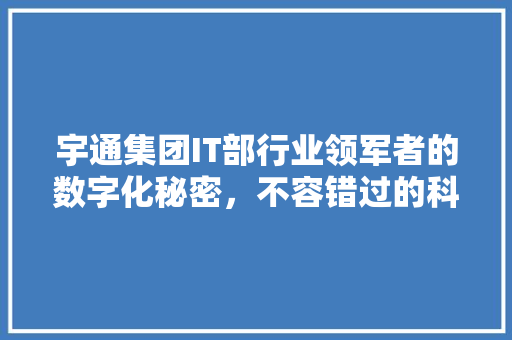In today's fast-paced digital world, information technology (IT) plays a pivotal role in shaping our lives and enhancing communication. As technology continues to evolve, the integration of IT into our daily routines has become indispensable. One significant benefit of embracing IT is the enhancement of our English language skills. This article explores how mastering IT usage can contribute to more fluent and effective English expression.
I. The Importance of IT in Language Learning

1. Access to Diverse Resources
The advent of IT has revolutionized the way we acquire knowledge. With just a few clicks, we can access an array of resources, including dictionaries, grammar guides, and language learning platforms. These tools not only provide immediate assistance but also encourage self-study and self-improvement.
2. Interactive Learning Experiences
IT offers interactive learning experiences that cater to different learning styles. Through games, quizzes, and simulations, learners can engage with the language in a fun and engaging manner. This approach fosters better retention and comprehension, making language learning more enjoyable and effective.
3. Global Communication
The internet has broken down language barriers, enabling people from different parts of the world to communicate seamlessly. By mastering IT, individuals can expand their vocabulary, improve grammar, and develop a more natural accent. This global connectivity enhances cross-cultural understanding and fosters a sense of community.
II. Mastering IT Usage for Enhanced English Expression
1. Keyboard Shortcuts
Keyboard shortcuts can significantly speed up typing and reduce the time spent on mundane tasks. By familiarizing oneself with commonly used shortcuts, learners can focus more on their writing and communication, rather than struggling with the mechanics of the keyboard.
2. Online Writing Tools
Online writing tools, such as grammar checkers and style guides, can help learners identify and correct errors in their writing. By utilizing these resources, individuals can improve their grammar, vocabulary, and overall writing quality. Some popular online tools include Grammarly, Hemingway Editor, and the Purdue OWL.
3. Social Media and Forums
Engaging with native speakers through social media platforms and forums can provide valuable insights into colloquial language, idioms, and cultural nuances. By interacting with others, learners can expand their vocabulary, practice their writing skills, and gain confidence in their English expression.
4. Language Learning Apps
Mobile apps dedicated to language learning offer convenient and accessible resources for learners. These apps often feature interactive lessons, pronunciation guides, and quizzes, making it easier to incorporate language learning into daily routines.
III. The Role of IT in Professional Communication
1. Email Etiquette
In the professional world, email is a primary mode of communication. Mastering IT usage, particularly email etiquette, is crucial for conveying messages effectively and professionally. This includes understanding proper grammar, punctuation, and tone.
2. Video Conferencing
With the rise of remote work, video conferencing has become an essential tool for business communication. By familiarizing oneself with video conferencing platforms, such as Zoom and Microsoft Teams, individuals can present themselves as polished and professional.
3. Collaboration Tools
Collaboration tools, such as Google Drive and Trello, facilitate teamwork and project management. By utilizing these tools, professionals can communicate effectively with colleagues, share documents, and track progress.
IV. Conclusion
Mastering IT usage is an essential aspect of enhancing English expression. By leveraging the power of technology, individuals can improve their language skills, expand their vocabulary, and communicate more effectively. As technology continues to evolve, embracing IT will become increasingly important in both personal and professional settings. By harnessing the potential of IT, we can unlock the door to more fluent and natural English expression.






